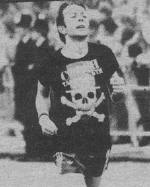 THE CONNECTION BETWEEN MUSIC AND RUNNING
THE CONNECTION BETWEEN MUSIC AND RUNNING Obviously, you all know I love music, but something else I've grown to love is running. I've been jogging regularly for years now, and I've even done a few marathons. On the surface, these two hobbies seem to have little in common. In fact, most people associate music (especially rock-and-roll) with drinking, drugging, staying out late, and all-around abusing one's body. Fitness, on the other hand, holds various "uncool" associations, from military basic training to narcissistic gym culture to, well, Richard Simmons.
I admit the jogger scene is not exactly cool. (Go to any New York Road Runners Club-sponsored race and you'll see what I mean.) But running, the activity itself, is cool -- and it is cool in fundamentally the same way that music is cool. The beauty of music, of course, is how it fills its listener with a magical, expansive sensation of total freedom and infinite possibility. Not unlike the feeling, I've come to realize, that I get when my two feet hit the pavement and I just take off.

Now that I've made this mental connection between music and running, I've been on a search to find more evidence of the unlikely link between the two passions of mine. It hasn't been easy. Yes, there are tons of famous songs about running, from "I Ran" by Flock of Seagulls to "Born to Run" by Springsteen, but they seem to all be about running toward something, running away from something, running wild, running free -- not about literally running, just for the sake of running.
There are songs that are associated in the public's consciousness with the literal kind of running, such as Vangelis's "Chariots of Fire." And there exist lots of pump-you-up songs that are excellent to listen to while you run, like "Ain't No Stopping Us Now" by McFadden & Whitehead.
 But I can only think of one example of a song that is about running per se. Thankfully, it is a gorgeous tune: "Joggin'" by reggae great Freddie McGregor. Not only does it feature a chorus about "jogging on the sand," it even name-checks different brands of running shoes (Adidas, Puma).
But I can only think of one example of a song that is about running per se. Thankfully, it is a gorgeous tune: "Joggin'" by reggae great Freddie McGregor. Not only does it feature a chorus about "jogging on the sand," it even name-checks different brands of running shoes (Adidas, Puma).
But upon closer inspection, is the song just a simple, heartfelt tribute to running, "a paean to trainers," as it says in the liner notes of my Story of Jamaican Music box set? Or is it an extended metaphor "damning corporate imperialism and condemning those who get fit for Babylon," as it suggests here?
Okay, so trying to find a running anthem is a bit of a challenge. But what about trying to find some musical artists who are also big runners? Again, not so easy. There are a few celebrities who have run marathons including, famously, Oprah, and more recently, Will Ferrell. And some politicians, including President Bush (which doesn't exactly help me in trying to make the argument that jogging is cool).

In terms of music, though, other than P Diddy -- who ran the NYC marathon a few years back, but whose own contributions to music I find dubious (as opposed to his undeniable role in the careers of talented artists like Biggie and Mary J Blige) -- I could only think of one single performer whom I knew was a runner . . .
The late Joe Strummer of the Clash ran three marathons. (That's him in the photo on the right finishing the London marathon.) He even revealed that he wouldn't train at all and he'd drink ten pints of beer the night before. Now, that's punk rock! Who cares that he didn't take training seriously? Jumping in there and running a long-distance race obviously gave him a feeling of joy and liberation. And that's enough for me. Joe is all the proof I need that jogging is hella cool, fuck the naysayers.
Like all the best music, Strummer's work was dangerous and sexy and it was all about challenging the status quo. Not just in your typical abstract, anti-establishment, rock-and-roll way, but in an unusually political, concrete sense. Unlike his peers in the Sex Pistols, he wasn't a nihilist -- he was committed to changing the world for the better, through his raw, visceral music and provocative lyrics. Politically-oriented artists always run the risk of either sounding too soft and pie-in-the-sky (Lennon's "Imagine" sometimes strikes me this way, even though I recognize how radical many of the lines are) or sounding pedantic and restrictively topical (I'm thinking here of KRS-One's less-classic material). To Strummer's credit, he and the Clash broke right through these confines, forging their own path and making political music cool again.
It is Joe's brand of gritty idealism that continues to inspire me. And his passion for gonzo running -- and the freedom it represents -- seems to me an extension of this worldview.




















